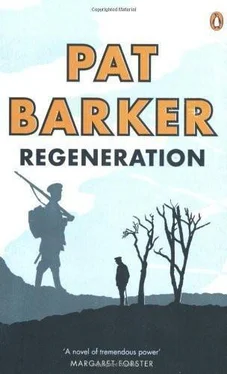The lifeboat came back later that morning. Rivers looked out of the living room window and saw it beached at the water’s edge, in that narrow space between the coils of tangled and rusting wire. He went out to watch.
The men were laying down the flat wooden skids over which the boat would be winched slowly back into place. A small group of villagers, mainly relatives of the crew, had gathered and were talking in low voices. The sea was choppy, but with none of the menace of the previous night. A light drizzle had begun to fall, matting the surface hairs on the men’s jerseys and woollen caps.
When he got back, he found Burns stirring, though not yet up.
‘Are they back?’ he asked.
‘Yes, they’re hauling her up now.’
Burns got out of bed and came across to the window. The drizzle had become a downpour. The lifeboat, now halfway up the beach, was obscured by sheets of smoking rain.
‘Be a load off Mrs Burril’s mind. She’s got two sons in the crew.’
‘Yes. She said.’
‘You mean she spoke?’
‘We had quite a chat. I didn’t know the lifeboat was such a family matter.’
‘Oh, yes. You see it on the memorial in the church. Not a good idea, really. From the woman’s point of view.’ A long pause. Then Burns added, ‘You get the same thing in a battalion. Brothers joining up together.’
Rivers went very still. This was the first time Burns had volunteered any information at all about France. Even in Craiglockhart, where he couldn’t altogether avoid talking about it, the bare facts of his war service had had to be prised out of him.
‘You know, you’ll be writing letters and suddenly you realize you’ve written the same name twice.’
Rivers said carefully, ‘That must be one of the worst jobs.’
‘You get used to it. I did it for eighty per cent of the company once.’
A long silence. Rivers was beginning to think he’d dried up, but then he said, ‘That was the day before the Somme. They got out there, and there was this bloody great dyke in the way. You couldn’t see it from the trench because there were bramble bushes round it. And it wasn’t on the map. Everybody bunched up, trying to get across it. German machine-gunners had a field day. And the few who did manage to get across were cut to pieces on the wire. General came round the following day. He said, “My God, did we really order men to attack across that?” Apparently we were intended to be a diversion from the main action. Further south.’
Slowly, Burns began to talk. He’d been promoted captain at the age of twenty-one, and this promotion coincided with the run-up to the Somme campaign. In addition to all the other strains, he’d been aware of a widespread, though unvoiced, opinion in the company that he was too young for the command, though in length of service he had been senior.
The story was one Rivers was well used to hearing: healthy fear had given way to indifference, and this in turn had given way to a constant, overwhelming fear, and the increasing realization that breakdown was imminent. ‘I used to go out on patrol every night,’ Burns said. ‘You tell yourself you’re setting a good example, or some such rubbish, but actually it’s nothing of the kind. You can’t let yourself know you want to be wounded, because officers aren’t supposed to think like that. And, you see, next to a battle, a patrol is the best chance of getting a good wound. In the trenches, it’s shrapnel or head injuries. On patrol, if you’re lucky, it’s a nice neat little hole in the arm or leg. I’ve seen men cry with a wound like that.’ He laughed. ‘Cry for joy. Anyway, it wasn’t my luck. Bullets went round me, I swear they did.’ A pause. ‘It was going to happen anyway, wasn’t it?’
‘The breakdown? Oh yes. You mustn’t attribute breaking down to that one incident.’
‘I went on for three days afterwards.’
‘Yes, I know.’
They talked for over an hour. Near the end, after they’d been sitting in silence for a while, Burns said quietly, ‘Do you know what Christ died of?’
Rivers looked surprised, but answered readily enough. ‘Suffocation. Ultimately the position makes it impossible to go on inflating the lungs. A terrible death.’
‘That’s what I find so horrifying. Somebody had to imagine that death. I mean, just in order to invent it as a method of execution. You know that thing in the Bible? “The imagination of man’s heart is evil from his youth”? I used to wonder why pick on that? Why his imagination? But it’s absolutely right.’
Rivers, going downstairs to make the tea, thought that a curious thing had happened during that conversation. For the first time, Burns had been able to put the decomposing corpse into some kind of perspective. True, he hadn’t managed to talk about it, but at least it hadn’t prevented him, as it so often had in the past, from talking about other, more bearable aspects of his war experience. Yet, at the same time, Rivers’s own sense of the horror of the event seemed actually to have increased. It was different in kind from other such experiences, he thought, if only because of the complete disintegration of personality it had produced. He was very fond of Burns, but he could discern in him no trace of the qualities he must have possessed in order to be given that exceptionally early command. Not that one could despair of recovery. Rivers knew only too well how often the early stages of change or cure may mimic deterioration. Cut a chrysalis open, and you will find a rotting caterpillar. What you will never find is that mythical creature, half caterpillar, half butterfly, a fit emblem of the human soul, for those whose cast of mind leads them to seek such emblems. No, the process of transformation consists almost entirely of decay. Burns was young, after all. If today really marked a change, a willingness to face his experiences in France, then his condition might improve. In a few years’ time it might even be possible to think of him resuming his education, perhaps pursuing that unexpected interest in theology. Though it was difficult to see him as an undergraduate. He had missed his chance of being ordinary.
Rivers arrived back at Craiglockhart in the late afternoon of yet another stormy day. This autumn seemed to have a store of such days, slapping them down remorselessly, one after the other, like a fortune-teller with a deadly pack of cards. The trees had already shed their leaves. They blew across the tennis courts and, when Rivers pushed open the swing doors, accompanied him into the hall.
Where a football match seemed to be in progress. A knot of struggling backs and thighs gradually unravelled, as they became aware of him standing there. On the black and white tiled floor lay a mud-brown, pork-pie hat, evidently belonging to a visitor. Rivers looked round the group and found Sassoon. ‘Careful with that hat, Sassoon,’ he said, and passed through on his way to his office.
Behind him, a much subdued Sassoon picked up the hat, punched it into some semblance of its former shape, and restored it to the peg. The other footballers slunk away.
Bryce was standing at the window of his room, looking out over the leaf-littered tennis courts. Pausing in the doorway, Rivers thought he looked older, but then he turned, and seemed as full of energy as ever.
‘Did you get my letter?’ Rivers asked.
‘I did.’
‘I’ve said I’ll wait and see how things turn out.’
‘Take it, for God’s sake. It’s quite obvious how things are going to turn out. I don’t expect to be here next month.’ He smiled. ‘Of course they might appoint you.’
Rivers shook his head. ‘No, they won’t do that. I’m too identified with you.’
Читать дальше












